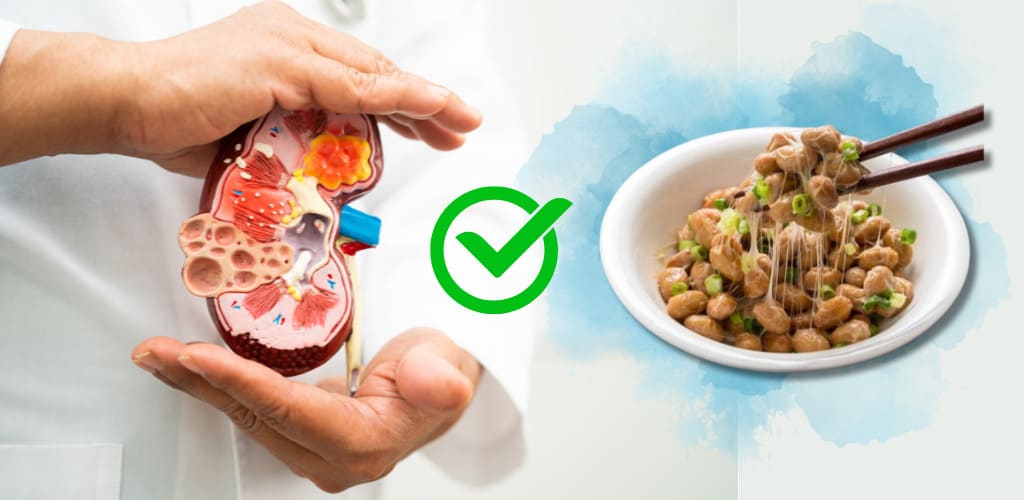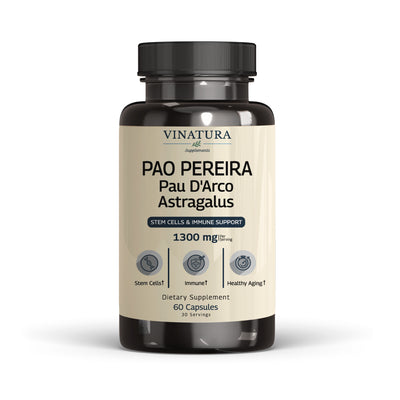
Is Nattokinase Good for Kidneys? Helpful or Harmful?
Nattokinase is gaining attention for its benefits to cardiovascular and blood circulation health. However, is Nattokinase beneficial for kidney health as well?
This article will delve deeper into the potential of Nattokinase through scientific reports and reviews from the experiences of those who have used it.
Before exploring further, please read the disclaimer located at the end of this webpage.
Key Takeaways
- Nattokinase may indirectly improve kidney function by supporting cardiovascular health.
- The benefits of Nattokinase for the kidneys include blood pressure control, reduced risk of atherosclerosis, decreased inflammation, improved circulation, and many other advantages.
- When using Nattokinase to support kidney health, it is essential to consult a doctor, especially for those with kidney disease.
Is Nattokinase Good for the Kidneys?

The benefits of Nattokinase for cardiovascular health may indirectly improve kidney function. Since kidney health is closely linked to cardiovascular health, anything beneficial for the heart and blood vessels may also positively impact the kidneys.
The benefits of Nattokinase for the kidneys stem from its beneficial effects on blood pressure control, reduced risk of atherosclerosis, and several other advantages.
Benefits of Nattokinase for Kidneys
Experts have shown that Nattokinase significantly benefits blood pressure, blood circulation, and inflammation.
Blood Pressure Control
High blood pressure is one of the leading causes of kidney damage and chronic kidney disease. High blood pressure puts excessive pressure on the small blood vessels in the kidneys, leading to damage to the kidney cells.
Hypertension negatively affects the kidneys by damaging the arteries near the kidneys, which limits essential blood flow to this critical area.
When kidney cells are damaged, they cannot efficiently filter waste and excess fluid out of the body. The accumulation of waste in the body can harm other organs and increase the risk of dangerous complications [1].
Research shows that Nattokinase helps reduce blood pressure, especially systolic and diastolic levels, in individuals with hypertension. This effect seems to be more pronounced in males [2].
By improving hypertension, Nattokinase effectively enhances the likelihood of maintaining healthy kidneys.
Nattokinase's primary mechanism of action is the release of an enzyme called plasmin from the proenzyme plasminogen.
Plasmin is a natural enzyme capable of breaking down fibrin. When fibrin is broken down, blood clots dissolve, preventing the formation of large blood clots and reducing the risk of blood vessel blockages.
As blood vessels dilate, the pressure on the vessel walls decreases, thereby reducing overall pressure in the circulatory system and helping to control blood pressure [6].
Reduced Risk of Atherosclerosis

Nattokinase can break down fibrin. This protein can contribute to blood clot formation and plaques within arteries. This can lead to blockages or reduced blood flow, increasing the risk of atherosclerosis.
By breaking down fibrin, Nattokinase helps maintain smooth blood circulation and reduces the risk of arterial blockages [3].
High blood pressure increases the risk of arterial plaque formation, in which arteries become stiff and narrow. Arterial plaque buildup can affect arteries leading to the kidneys, reducing blood flow to the kidneys and impairing their function.
Reducing Inflammation
In vitro and animal studies have shown that Nattokinase may reduce oxidative stress and inflammation. Oxidative stress and inflammation are crucial in many diseases, including cardiovascular diseases.
Research on the anti-inflammatory properties of Nattokinase is ongoing, but results are still limited in humans [4].
Improving Circulation
Nattokinase is believed to work by inhibiting the formation of thromboxane A2, a chemical messenger that promotes platelet aggregation. This reduces the ability of platelets to stick together and block blood circulation [5].
Additionally, Nattokinase can dissolve fibrin, helping prevent the development of existing blood clots and potentially dissolve smaller ones, thereby improving blood circulation.
Consideration When Using Nattokinase for Kidney Disease

When using Nattokinase to support kidney health, it's important to note:
Consulting with a doctor is crucial before starting any supplementation regimen, especially for those with kidney disease. They can assess your condition, medical history, and current medications to determine if Nattokinase suits you.
Although Nattokinase is often praised for its ability to improve blood circulation and prevent blood clots, individuals with kidney disease may already have a higher risk of bleeding due to impaired kidney function. Additionally, Nattokinase may increase the risk of bleeding when taken with blood-thinning medications such as warfarin, heparin, or aspirin. It can also interact with supplements like ginkgo biloba or garlic, which are known to elevate bleeding risks.
The effects of Nattokinase on kidneys are not direct, and the supplement is not recommended as a kidney support tool. Therefore, the use of Nattokinase should be carefully monitored to avoid excessive bleeding and potential complications. People with bleeding disorders or those taking medications or supplements that increase bleeding risk should avoid using Nattokinase.
It’s also important to be aware of potential gastrointestinal side effects like nausea, vomiting, and diarrhea. In some cases, higher doses may cause headaches or dizziness. Always follow the recommended dosage and administration guidelines, and discontinue use immediately if any negative side effects occur.
Frequently Asked Questions
Can Nattokinase Reverse Kidney Damage?
No strong scientific evidence supports the use of Nattokinase for reversing kidney damage. Most studies on Nattokinase focus on its effects on blood pressure and blood clots, indirectly helping the kidneys avoid potential dangers.
Are There Natural Alternatives to Nattokinase for Kidney Support?
There are several other natural medicinal alternatives to Nattokinase that can provide kidney support, such as Vitamin D, Curcumin (Turmeric), Green Tea, Flaxseeds and Walnuts, Astragalus Root
Conclusion
The article clarifies the issue: "Is Nattokinase good for the kidneys? Are they beneficial or harmful?" Hope this information is helpful to you.
Nattokinase has great potential in improving kidney function. Currently, there are many highly-rated Nattokinase supplements on the market. You can refer to and use them according to your needs.
However, there are still many limitations in the available evidence and research. Therefore, the use of Nattokinase for kidney health should be carefully considered and discussed with a doctor about the dosage of Nattokinase to ensure safety and effectiveness.
Related Articles:
- Benefits Of Nattokinase Supplements: Side Effects & Usage
- Why should you take nattokinase on empty stomach?
- Nattokinase Drug Interactions & Nattokinase Contraindications
References
- [1] and, D. (2024, April 9). High Blood Pressure & Kidney Disease. National Institute of Diabetes and Digestive and Kidney Diseases; NIDDK - National Institute of Diabetes and Digestive and Kidney Diseases. https://www.niddk.nih.gov/health-information/kidney-disease/high-blood-pressure
- [2] Jensen, G. S., Lenninger, M., Ero, M. P., & Benson, K. F. (2016). Consumption of nattokinase is associated with reduced blood pressure and von Willebrand factor, a cardiovascular risk marker: results from a randomized, double-blind, placebo-controlled, multicenter North American clinical trial. Integrated Blood Pressure Control, Volume 9, 95–104. https://doi.org/10.2147/ibpc.s99553
- [3] Chen, H., Chen, J., Zhang, F., Li, Y., Wang, R., Zheng, Q., Zhang, X., Zeng, J., Xu, F., & Lin, Y. (2022). Effective management of atherosclerosis progress and hyperlipidemia with nattokinase: A clinical study with 1,062 participants. Frontiers in Cardiovascular Medicine, 9. https://doi.org/10.3389/fcvm.2022.964977
- [4] Effects of Nattokinase on Inflammation and Cardiovascular Risk Markers in Patients With Dyslipidemia - Full Text View - ClinicalTrials.gov. (2023). Clinicaltrials.gov. https://classic.clinicaltrials.gov/ct2/show/NCT06183307
- [5] Jang, J.-Y., Kim, T.-S., Cai, J., Kim, J., Kim, Y., Shin, K., Kwang Sei Kim, Sung Kyeong Park, Lee, S.-P., Choi, E.-K., Man Hee Rhee, & Kim, Y.-B. (2013). Nattokinase improves blood flow by inhibiting platelet aggregation and thrombus formation. Laboratory Animal Research, 29(4), 221–221. https://doi.org/10.5625/lar.2013.29.4.221
- [6] Weng, Y., Yao, J., Sparks, S., & Kevin Yueju Wang. (2017). Nattokinase: An Oral Antithrombotic Agent for the Prevention of Cardiovascular Disease. International Journal of Molecular Sciences, 18(3), 523–523. https://doi.org/10.3390/ijms18030523
Author

Product Disclaimer
The dietary supplement products mentioned on this website are formulated based on scientific research and adhere to FDA guidelines for dietary supplements. However, the content of the articles has not been evaluated by the Food and Drug Administration (FDA) and is not intended to promote or endorse any specific product. Any products sold on this website are not intended to diagnose, treat, cure, or prevent any disease.
Opinions and Endorsements
Any claims, statements, or opinions expressed in the articles are those of the author(s) and do not necessarily reflect the views or opinions of the manufacturers of the dietary supplement products. The products sold on this website are separate from the content of the articles and are not directly endorsed or associated with the information presented here.
Liability Disclaimer
The author(s) of the articles, website, and manufacturers of the dietary supplement products do not assume any liability for any potential consequences arising from the use of the information provided in the articles. It is recommended that individuals consult with a qualified healthcare professional before making any dietary or lifestyle changes, including the use of dietary supplements.
Product Usage
Please refer to the product labels and packaging for specific usage instructions and guidelines for the dietary supplement products sold on this website.
Customer Support
For any concerns or questions regarding the dietary supplement products, please contact our customer support team, who will be more than happy to assist you.





Leave a Comment
Be the first to comment.
What do you think?